N-Acetyl Cysteine (NAC) and Mood Disorders: What the Research Says
Introduction
In recent years, one supplement has quietly emerged as one of the most promising natural tools for supporting emotional and mental health — N-Acetyl Cysteine (NAC).
Originally used in hospitals to treat acetaminophen overdose and respiratory conditions, NAC has attracted growing scientific interest for its potential in depression, bipolar disorder, anxiety, and even obsessive-compulsive disorder (OCD).
But what exactly is NAC, and why are psychiatrists and neuroscientists paying attention to it? Let’s explore the research, mechanisms, and best practices for using NAC to support mood regulation and emotional resilience 🌿
Looking for supplements for Brain Fog? Click here.
🌿 What Is N-Acetyl Cysteine (NAC)?
N-Acetyl Cysteine is a modified form of the amino acid L-cysteine. Once in the body, NAC converts into glutathione — one of the most powerful antioxidants that protects cells from oxidative stress.
In medical settings, NAC is used for:
Detoxifying the liver in acetaminophen overdose 💊
Thinning mucus in chronic respiratory diseases 🌬️
Supporting detoxification and inflammation control
But over the last two decades, researchers have discovered that NAC also affects the brain’s chemistry, particularly systems related to glutamate, dopamine, and inflammation — all of which are involved in mood disorders.
🧬 The Biological Link Between Oxidative Stress and Mood Disorders

Before understanding how NAC works, it helps to know why antioxidants matter for mental health.
Mood disorders like depression, bipolar disorder, and anxiety are not just psychological — they’re biochemical. Studies show that people with chronic mood issues often have:
Low glutathione levels, the brain’s master antioxidant.
Increased oxidative stress, which damages neurons.
Elevated inflammation markers like IL-6 and TNF-alpha.
Dysregulated glutamate, the brain’s main excitatory neurotransmitter.
This combination can lead to “neuroinflammation,” mitochondrial dysfunction, and neurotransmitter imbalance — all linked to mood instability.
✨ This is where NAC comes in: It restores antioxidant defenses, reduces inflammation, and helps normalize glutamate activity in the brain.
⚗️ How NAC Works in the Brain
NAC has multiple overlapping mechanisms that make it unique among supplements for mental health.
🔹 Replenishes Glutathione (GSH)
Glutathione is your body’s most important antioxidant — it neutralizes free radicals and protects brain cells from stress. NAC provides cysteine, the rate-limiting precursor for making glutathione.
🧠 Why it matters: People with mood disorders often show lower brain glutathione levels, suggesting that oxidative stress contributes to emotional dysregulation.
🔹 Regulates Glutamate
Glutamate is essential for cognition and memory — but too much of it overstimulates neurons, leading to excitotoxicity and anxiety.
NAC helps normalize glutamate transmission, particularly in the nucleus accumbens, a brain region involved in motivation, reward, and mood regulation.
📉 Overactive glutamate = agitation and rumination
📈 Balanced glutamate = calm focus and emotional steadiness
🔹 Reduces Neuroinflammation
Chronic inflammation in the brain is increasingly recognized as a key factor in depression and bipolar disorder. NAC has been shown to downregulate pro-inflammatory cytokines and restore balance in immune signaling.
🔹 Improves Mitochondrial Function
Your brain consumes a massive amount of energy. NAC supports mitochondria — the “powerhouses” of cells — improving ATP production and resilience under stress.
💪 Healthy mitochondria = more stable energy, mood, and cognition.
🔹 Supports Dopamine Regulation
In conditions like bipolar disorder and OCD, dopamine signaling can become dysregulated. NAC helps modulate dopamine release, supporting balanced motivation and reducing compulsive behaviors.
💊 NAC in Depression: What the Studies Show
📖 Clinical Evidence
🧩 Study 1: NAC in Major Depressive Disorder (MDD)
A 2016 meta-analysis published in Journal of Clinical Psychiatry analyzed multiple trials on NAC in depression. The conclusion: NAC significantly improved depressive symptoms, especially when combined with standard antidepressant treatment.
👉 Key finding: The strongest benefits appeared after 6–12 weeks of supplementation.
🧩 Study 2: Bipolar Depression
One of the most well-known studies on NAC was conducted by Dr. Michael Berk and colleagues (Biological Psychiatry, 2008). In this randomized controlled trial, participants with bipolar disorder received 2,000 mg/day of NAC for 24 weeks.
📊 Results:
Significant improvement in depressive symptoms.
Better functioning and quality of life scores.
No increase in manic symptoms — indicating NAC is mood-stabilizing, not stimulating.
🔬 Follow-up studies confirmed these findings, suggesting NAC could be an effective adjunct to medication in bipolar depression.
🧩 Study 3: Persistent Depression and Inflammation
In a 2019 review (Neuroscience & Biobehavioral Reviews), researchers found that NAC improved mood, motivation, and cognition — particularly in people with elevated inflammation markers or oxidative stress.
💡 Translation: NAC may help most in “inflammatory depression,” where inflammation interferes with serotonin and dopamine signaling.
💬 Summary of NAC in Depression
✅ Reduces oxidative stress
✅ Improves mitochondrial function
✅ Enhances antidepressant response
✅ Safe and well-tolerated
⏳ Best results appear after consistent use for 2–3 months.
💫 NAC in Bipolar Disorder
📖 Clinical Research
The 2008 Biological Psychiatry study on bipolar disorder remains the landmark trial — but subsequent studies have reinforced NAC’s benefits:
Mood stabilization: NAC reduced depressive episodes without triggering mania.
Cognitive benefits: Participants reported clearer thinking and emotional regulation.
Inflammation control: Biomarkers of oxidative stress improved significantly.
However, not every study has found large effects. Some follow-ups reported smaller improvements, suggesting NAC may work best as a long-term adjunct, not a quick fix.
🧘 In practice: Many psychiatrists use NAC alongside mood stabilizers or lithium to enhance resilience and reduce depressive phases.
🔄 NAC and Obsessive-Compulsive Disorder (OCD)
OCD involves compulsive behaviors and intrusive thoughts — linked to dysregulated glutamate and dopamine signaling.
📖 The Research
A 2012 Journal of Clinical Psychopharmacology study found that 2400 mg/day NAC reduced compulsive symptoms in adults with treatment-resistant OCD.
Improvements were also noted in trichotillomania (hair-pulling) and nail-biting — both considered part of the obsessive-compulsive spectrum.
💬 Mechanism: NAC’s ability to normalize glutamate in the prefrontal cortex helps reduce intrusive or repetitive thought patterns.
🌿 NAC and Anxiety Disorders
While fewer studies exist for anxiety alone, evidence suggests NAC indirectly benefits anxious individuals by:
Lowering inflammation (which worsens anxiety).
Supporting GABA and glutamate balance.
Enhancing sleep quality.
🌙 Some case reports show NAC (1200–1800 mg/day) helps reduce racing thoughts and tension, especially in stress-related anxiety or mixed depression-anxiety states.
🧩 NAC in Schizophrenia and Psychotic Disorders
Schizophrenia and schizoaffective disorder — which share features with bipolar disorder — also involve oxidative and glutamate imbalances.
In a 2008 Biological Psychiatry study, NAC improved:
Cognitive function
Negative symptoms (apathy, low motivation)
Overall daily functioning
🧠 NAC seems to protect neurons and improve glutathione status in these patients, which may help prevent cognitive decline.
🍽️ How to Take NAC Safely
💊 Typical Dosage Range
| Goal | Dose | Notes |
|---|---|---|
| General antioxidant support | 600–1200 mg/day | 1–2 divided doses |
| Depression / Bipolar support | 2000–2400 mg/day | Divided morning & afternoon |
| OCD / Anxiety | 1800–3000 mg/day | Gradually increase as tolerated |
📆 Duration: Clinical benefits usually appear after 6–12 weeks of consistent use.
💧 Timing
Take with meals to reduce stomach discomfort.
Avoid taking late in the evening — some people report mild stimulation.
🥑 Best Combinations
NAC pairs well with:
Omega-3 fatty acids: Anti-inflammatory synergy.
CoQ10: Mitochondrial energy support.
Vitamin C: Regenerates glutathione faster.
Magnesium: Enhances calm and stress resilience.
⚠️ Possible Side Effects
NAC is generally very safe, but mild reactions can occur:
Nausea or upset stomach
Headache or mild dizziness
Rarely, heartburn
To minimize side effects:
Start with 600 mg/day, then increase gradually.
Stay hydrated — NAC is mildly sulfuric in nature.
🚫 Precautions
Avoid combining NAC with nitroglycerin or charcoal (interaction risk).
People with asthma should use caution — it may loosen mucus.
Always discuss NAC with your psychiatrist before starting, especially if you take antidepressants or mood stabilizers.
🌞 The Emotional and Cognitive Benefits Users Report
Many people who take NAC for mood support describe:
Fewer emotional “crashes” 🌿
Improved motivation and concentration ⚡
Reduced inner tension and rumination 🌬️
Greater sense of calm and stability 💛
These effects often build gradually — NAC doesn’t create a buzz or euphoria, but rather a gentle, steady improvement in resilience and focus.
💬 It feels like your brain runs cleaner — fewer emotional spikes, more balance.
🧘 Lifestyle Habits That Enhance NAC’s Effect
NAC works best as part of a comprehensive self-care plan.
🌿 Combine With:
Balanced Nutrition:
Eat antioxidant-rich foods: berries, leafy greens, nuts, and fish.
Avoid ultra-processed, high-sugar foods that trigger inflammation.
Daily Movement:
Moderate exercise increases natural glutathione levels.
Aim for 20–30 minutes of walking, yoga, or cycling daily.
Mindfulness or Breathwork:
Reduces stress-driven inflammation.
Try 5 minutes of deep breathing morning and evening.
Sleep Hygiene:
Prioritize 7–9 hours nightly; poor sleep depletes glutathione.
💡 NAC supports your biology — lifestyle supports your biology’s rhythm.
🧘 NAC vs. Other Mood-Supporting Nutrients
| Nutrient | Main Benefit | Works Best With |
|---|---|---|
| NAC | Restores glutathione, reduces inflammation | Vitamin C, Omega-3 |
| Magnesium | Calms nervous system, improves sleep | L-Theanine |
| CoQ10 | Improves energy and mitochondrial health | NAC |
| Omega-3 | Anti-inflammatory, boosts serotonin | NAC, Vitamin D |
| Vitamin D | Regulates mood and circadian rhythm | Omega-3, B12 |
| B Vitamins | Support neurotransmitter production | Magnesium, NAC |
NAC stands out because it acts both as an antioxidant and neurotransmitter modulator, bridging physical and emotional health.
Looking for supplements for Brain Fog? Click here.
🌈 NAC and the Future of Psychiatry

Modern psychiatry is shifting from symptom suppression toward biochemical optimization — addressing root causes like inflammation and oxidative stress.
NAC’s unique profile — safety, affordability, and broad benefits — makes it a key part of this evolution.
Ongoing studies are exploring NAC for:
Treatment-resistant depression
Addiction and craving regulation
Anxiety and PTSD
Long COVID-related brain fog
🔬 Researchers believe NAC may help restore the homeostatic balance that stress and illness disrupt — not by blocking symptoms, but by helping the body self-regulate.
💬 Real-World Example
Case Study:
Maria, 35, had struggled with bipolar depression and fatigue for years. Despite being on medication, she felt emotionally “flat.”
Her psychiatrist added 2000 mg NAC daily. Within two months, Maria noticed:
More consistent energy
Fewer depressive dips
Less brain fog
💭 “It didn’t change my personality — it made me feel clearer. Like my brain finally exhaled.”
While everyone’s experience differs, Maria’s story reflects what many report: subtle but meaningful improvement in daily mood regulation.
⚖️ Key Takeaways
✅ NAC supports brain health by restoring glutathione and regulating glutamate and dopamine.
✅ Research shows benefits for depression, bipolar disorder, OCD, and anxiety.
✅ Safe and well-tolerated at 1200–2400 mg/day.
✅ Works best as a complement to medication, not a replacement.
✅ Combine with omega-3s, vitamin C, and CoQ10 for full antioxidant synergy.
🌿 NAC offers hope for people seeking biological balance — not just symptom relief, but long-term emotional clarity and stability.
📚 References
Berk, M., et al. (2008). “N-acetyl cysteine for depressive symptoms in bipolar disorder: A double-blind randomized placebo-controlled trial.” Biological Psychiatry, 64(6), 468–475.
Fernandes, B. S., et al. (2016). “N-acetylcysteine in depressive symptoms: A systematic review and meta-analysis.” Journal of Clinical Psychiatry, 77(4), e457–e466.
Dean, O. M., et al. (2012). “N-acetylcysteine in psychiatry: Current therapeutic evidence and potential mechanisms of action.” Journal of Psychiatry & Neuroscience, 37(2), 78–86.
Magalhães, P. V., et al. (2011). “N-acetylcysteine for bipolar disorder: A systematic review and meta-analysis.” Journal of Clinical Psychiatry, 72(6), 794–799.
Minarini, A., et al. (2017). “N-acetylcysteine in the treatment of psychiatric disorders: Current status and future prospects.” Expert Opinion on Drug Metabolism & Toxicology, 13(3), 279–292.
Smaga, I., et al. (2015). “Oxidative stress as an etiological factor and a potential treatment target of psychiatric disorders.” Pharmacological Reports, 67(3), 569–580.
Dean, O. M., et al. (2021). “Emerging evidence for the role of NAC in neuropsychiatric disorders.” Frontiers in Pharmacology, 12(703).
Related Posts
-

Nootropics That Promote Calm and Rest
Explore the world of calming nootropics — natural brain enhancers that promote relaxation, better focus, and deeper rest. Learn how L-Theanine, magnesium, ashwagandha, and other adaptogens help balance your nervous system, reduce stress, and support restorative sleep.
-

Best Natural Supplement Stack for Sleep
Discover the best natural supplement stack for deep, restorative sleep. Learn how nutrients like magnesium, L-theanine, glycine, and calming herbs such as chamomile and ashwagandha work together to relax your body, calm your mind, and improve sleep quality—naturally and safely.
-

Combining L-Theanine and Magnesium for Sleep: A Calm Night, Naturally
Discover how combining L-Theanine and Magnesium can help you drift into deep, restorative sleep. Learn how this natural duo calms the mind, relaxes the body, and supports your nervous system—without grogginess the next morning.
-

How to Sleep Better After Intense Workouts
Struggling to fall asleep after a tough workout? Learn how to optimize your post-training recovery with nutrition, hydration, and science-backed sleep strategies. Discover how to calm your nervous system, balance hormones, and wake up fully recharged for your next session.
-

Ashwagandha and Valerian: A Bedtime Combo for Deep Rest and Emotional Reset
Discover the calming synergy of Ashwagandha and Valerian root, two natural sleep aids that help quiet the mind, ease anxiety, and promote deeper rest. Learn how this herbal duo supports the nervous system, balances stress hormones, and restores emotional peace — without next-day grogginess.
-

How to Create a Resilience-Boosting Diet
Discover how to build emotional and physical strength from the inside out with a resilience-boosting diet 🍎. Learn which foods stabilize your mood, how supplements like magnesium and omega-3s strengthen your stress response, and why pairing nutrition with breathwork and therapy creates lasting calm, focus, and vitality 🌿💪.
-

Best Teas and Herbal Blends for Calmness: Nature’s Way to Restore Inner Peace
Ashwagandha, the ancient adaptogenic herb, helps your body find balance during stress. Known as “Indian ginseng,” it supports cortisol regulation, boosts energy, and restores calm clarity. Discover how this powerful root promotes resilience, emotional balance, and steady vitality — one cup at a time. 🌸
-

Parenting and Emotional Strength: How to Raise Children Without Losing Yourself
Empathy is the bridge that connects hearts — the quiet power to understand, feel, and support another’s emotions without judgment. Learn how empathy strengthens relationships, enhances communication, and cultivates deeper compassion in everyday life. 🌿
-

How to Bounce Back from Public Failure: Reclaiming Confidence, Purpose, and Power
Visualization is more than imagination — it’s brain training for resilience. By picturing calm, success, or healing, you activate the same neural pathways as real experience. Learn how daily visualization rewires your brain for confidence, emotional balance, and recovery from stress. ✨
-

Coping with Financial Stress Through Resilience: How to Stay Grounded When Money Feels Tight
Body awareness is the foundation of emotional resilience. By tuning into your body’s signals — tension, fatigue, or calm — you learn to recognize stress before it overwhelms you. Discover how mindfulness, gentle movement, and breathwork can deepen your connection with your body and restore balance from the inside out. 🧘
-

How to Stay Positive During Chronic Illness: A Guide to Emotional Strength and Hope
Creativity is more than art — it’s a form of healing. Whether through painting, writing, music, or small acts of expression, creativity helps release emotion, calm the nervous system, and reconnect you to joy. Discover how to use creativity as a tool for emotional balance, resilience, and self-discovery. 🌿
-

Resilience Tips for Caregivers: How to Stay Strong While Caring for Others
Joy isn’t the absence of pain — it’s the quiet strength to find light even in challenging times. Cultivating joy through small daily moments restores balance, releases stress, and reminds you of life’s beauty. Learn how to reconnect with authentic happiness, rebuild emotional energy, and nurture your nervous system through gratitude, presence, and play. 🌿
-

Building Resilience After a Breakup: How to Heal, Rebuild, and Rise Stronger
Social connection is one of the strongest predictors of emotional resilience. During difficult times, genuine relationships act as anchors — calming the nervous system, reducing stress hormones, and helping you regain perspective. Learn how cultivating real human connection can strengthen your mind, heart, and overall well-being. 🌿
-

How to Stay Emotionally Strong During Job Loss
Your emotions are powered by brain chemistry — a delicate balance of neurotransmitters like serotonin, dopamine, and cortisol. When these chemicals work in harmony, you feel calm, focused, and resilient. Learn how daily habits, nutrition, and mindfulness can support your brain chemistry and boost emotional well-being naturally. 🌿
-

The Role of Hormones in Emotional Stability: How Your Chemistry Shapes Your Calm
Hormones shape more than your body — they shape your emotions, resilience, and sense of calm. From cortisol to serotonin, these chemical messengers influence how you react to stress, connect with others, and recover from challenges. Learn how to balance your hormones naturally to build lasting emotional stability and harmony within. 💫
-

Mitochondria and Emotional Energy: The Cellular Power Behind Your Mood
Breathwork is one of the most powerful tools for emotional regulation and cellular balance. Through intentional breathing, you can calm your nervous system, increase oxygen flow to the brain, and even support mitochondrial energy. Learn how conscious breathing connects body and mind — transforming stress into presence and emotional strength. 🌿
-

Inflammation and Its Impact on Mood Resilience: The Silent Link Between Body and Mind
Inflammation doesn’t just affect the body — it impacts the mind. Chronic inflammation alters brain chemistry, depletes serotonin, and makes emotional recovery harder. Learn how calming inflammation through nutrition, mindfulness, and sleep can restore balance, resilience, and a renewed sense of emotional strength. 💫
-

How Antioxidants Protect Emotional Well-being: The Hidden Link Between Oxidative Stress and Mental Health
Antioxidants do more than protect your body — they defend your mind. By neutralizing oxidative stress, antioxidants support serotonin, dopamine, and brain energy pathways that keep you calm, focused, and emotionally balanced. Discover how foods like berries, green tea, and dark chocolate nourish your brain, boost mood, and strengthen resilience from the inside out. 🌿✨
-

The HPA Axis and Emotional Health: The Hidden Bridge Between Stress and Mind
Neuroplasticity — the brain’s ability to rewire and adapt — is the foundation of emotional healing and resilience. When you face stress, trauma, or change, your neural pathways can reshape themselves to support new patterns of calm, focus, and self-awareness. Learn how daily practices like mindfulness, therapy, and breathwork strengthen neuroplasticity to transform emotional pain into personal growth. 🌸
-

Why Cortisol Control Is Key to Resilience: Mastering Stress to Build Emotional Strength
Controlling cortisol — the body’s main stress hormone — is the secret to lasting resilience. When cortisol levels stay balanced, your mind becomes clearer, emotions steadier, and energy more sustainable. Learn how breathwork, mindset shifts, adaptogens, and daily rhythms can help you calm your stress response and build true inner strength. 🌞💪
-

Dopamine’s Influence on Motivation and Recovery: Reigniting Drive and Balance
Healthy relationships are the foundation of emotional balance and resilience. Whether romantic, familial, or platonic, genuine connection releases dopamine, serotonin, and oxytocin — the brain’s “bonding trio” — helping us feel secure, motivated, and seen. Learn how trust, empathy, and communication not only strengthen your connections but also reshape your nervous system for deeper emotional well-being. 🌿🤝
-

The Role of Serotonin in Resilience: How This “Mood Molecule” Shapes Emotional Strength
Serotonin — often called the “resilience molecule” — plays a vital role in how we handle stress, regulate mood, and recover from emotional challenges. Beyond happiness, this powerful neurotransmitter helps balance the gut-brain axis, stabilize the nervous system, and support emotional flexibility. Learn how nutrition, sunlight, mindfulness, and adaptogens can naturally boost serotonin and strengthen your emotional resilience. 🌞🧠
-

How Neuroplasticity Supports Emotional Growth: Rewiring the Brain for Resilience
Neuroplasticity is the brain’s built-in power to grow, adapt, and heal — and it’s the foundation of emotional transformation. Every mindful breath, compassionate act, or reframed thought strengthens new neural pathways that support resilience and self-awareness. Learn how your brain rewires through daily habits, helping you turn emotional challenges into opportunities for growth and calm. 🌿
-

Tai Chi and Adaptogens for Mind-Body Balance: The Art of Harmonizing Energy and Resilience
Alchemy isn’t just an ancient science — it’s a timeless symbol of transformation and inner balance. By blending the physical and spiritual, alchemy teaches us that change begins from within. Just as metals are refined into gold, we too can transmute emotional pain, stress, and chaos into clarity and strength through mindful practice and self-awareness. 🌙✨
-

Cold Therapy and Emotional Control: Training the Mind Through the Body
Cold therapy isn’t just for athletes — it’s a tool for emotional mastery. By exposing your body to controlled cold, you train your nervous system to stay calm under stress, improving focus, mood, and resilience. This article explores the science of cold exposure, its impact on hormones and the vagus nerve, and how ice baths and cold showers can help you build emotional control, one breath at a time. 🧊🧘♂️
-

How Music Influences Emotional Recovery: The Healing Soundtrack of the Mind
Neuroplasticity — the brain’s ability to rewire and heal itself — is at the heart of emotional recovery. Through mindful habits, music, therapy, and consistent mental stimulation, your brain can form new connections that support resilience and well-being. Discover how neuroplasticity turns pain into growth, helping you rebuild balance, focus, and emotional strength. 🌿
-

Nature Therapy for Building Resilience: Reconnecting With the Healing Power of the Earth
Nature therapy helps rebuild emotional resilience by reconnecting you with the healing rhythms of the Earth. From forest walks to sunlight exposure, nature restores balance to your nervous system, lowers stress hormones, and teaches emotional adaptability. Learn how spending time outdoors can enhance mental clarity, calm anxiety, and awaken your natural capacity to heal. 🌞
-

Breathwork Techniques That Pair with Supplements: The Ultimate Synergy for Stress Relief and Mental Clarity
Breathwork and supplements create a powerful mind-body synergy for stress relief, focus, and energy. By combining intentional breathing with adaptogens, nootropics, and calming nutrients, you can naturally regulate cortisol, sharpen mental clarity, and boost emotional balance. This guide explores the best breathwork techniques and supplement pairings to help you feel centered, calm, and energized from the inside out. 🌿
-

Why Cortisol Balance Matters for Emotional Strength
Balancing cortisol — your body’s main stress hormone — is essential for emotional resilience. When cortisol is chronically high, your mind stays stuck in survival mode, leading to fatigue, anxiety, and emotional instability. This article explores how nutrition, supplements, breathwork, and therapy can help restore healthy cortisol rhythms, regulate the nervous system, and strengthen your ability to handle life’s challenges with calm focus and emotional strength. 🌿
-

Best Supplements for Students During Exam Season: Focus, Energy, and Memory Support
Studying late into the night? Learn which natural supplements can boost focus, memory, and mental stamina during exam season — without the crash. From omega-3s to Bacopa and Rhodiola, discover your brain’s ultimate exam support stack. 🎓🧠
-

Natural Memory Boosters for Seniors: How to Keep Your Mind Sharp and Focused
Stay mentally sharp and confident as you age. Discover science-backed natural supplements and lifestyle habits that boost memory, focus, and brain longevity for seniors. 🌿🧠
-

The Link Between Stress, Cortisol, and Memory Loss
Chronic stress can quietly erode your memory — and cortisol is the key culprit. Learn how stress hormones affect the brain, why the hippocampus shrinks under pressure, and how natural strategies can help you restore memory and mental clarity. 🧠✨
-

How to Build a Daily Supplement Routine for Memory Health
Want to sharpen your memory and stay mentally clear? Learn how to build a daily supplement routine for memory health — from morning focus to nighttime brain repair. Discover science-backed nutrients that boost recall, focus, and long-term cognitive resilience. 🧠🌿
-

Top 5 Natural Supplements for Memory Recall and Focus
Looking to boost memory and concentration naturally? Discover the top 5 supplements — Bacopa, Ginkgo Biloba, Lion’s Mane, Rhodiola, and Phosphatidylserine — that enhance focus, recall, and long-term brain health. 🧠✨
-

Top Supplements to Balance Mood Naturally
From omega-3s to adaptogens, discover the top natural supplements proven to support emotional balance, reduce stress, and promote inner calm — safely and effectively. 🌿✨
-
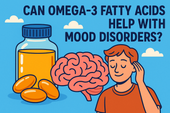
Can Omega-3 Fatty Acids Help with Mood Disorders?
Omega-3 fatty acids do more than support heart health — they can help balance mood, reduce depression, and calm anxiety. Discover how EPA and DHA nourish your brain, fight inflammation, and support emotional well-being from within. 🌊🧠
-

Vitamin D and Mood: The Sunshine Vitamin for Emotional Balance
Could the key to emotional balance be as simple as a little sunlight? Discover how vitamin D — the sunshine vitamin — influences serotonin, reduces inflammation, and helps you feel more positive and resilient year-round. ☀️💛
-

The Role of Magnesium in Reducing Irritability and Low Mood
Feeling on edge or emotionally drained? Magnesium could be the missing link between your body and your mood. Discover how this essential mineral reduces irritability, balances neurotransmitters, and helps your nervous system find calm again. 🌿✨
-
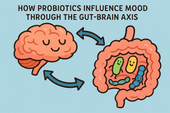
How Probiotics Influence Mood Through the Gut-Brain Axis
Discover how probiotics can do more than support your digestion—they can actually uplift your mood. This article explores the fascinating gut-brain axis and how balancing your gut bacteria through probiotics may help reduce anxiety, improve emotional stability, and support long-term mental well-being. 🌿🧠
-
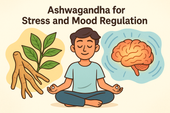
Ashwagandha for Stress and Mood Regulation
Discover how Ashwagandha, the powerful adaptogenic herb 🌿, helps your body manage stress and regulate mood. Learn how it balances cortisol, boosts GABA and serotonin, and supports emotional stability — helping you feel calm, focused, and resilient every day.
-
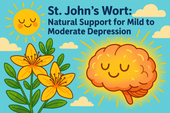
St. John’s Wort: Natural Support for Mild to Moderate Depression
Discover how St. John’s Wort, the “sunshine herb” 🌼, naturally supports mild to moderate depression. Learn how it boosts serotonin, balances mood, and promotes emotional resilience — with research showing its effectiveness compares to antidepressants, but with fewer side effects.
-
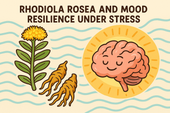
Rhodiola Rosea and Mood Resilience Under Stress
Discover how Rhodiola rosea helps your body adapt to stress 🌿. Learn how this powerful adaptogen balances cortisol, supports serotonin and dopamine, and strengthens emotional resilience — helping you stay calm, focused, and energized under pressure.
-

Chamomile and Lavender: Herbal Calm for Emotional Fluctuations
Discover how chamomile and lavender bring calm to emotional ups and downs 🌿. Learn how these two soothing herbs balance your nervous system, ease anxiety, and support restful sleep — naturally helping you find peace and emotional stability.
-
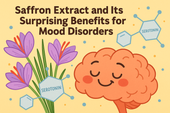
Saffron Extract and Its Surprising Benefits for Mood Disorders
Discover how saffron extract — the golden spice of joy 🌸 — can naturally support mood balance, ease anxiety, and lift mild depression. Learn what science says about its serotonin-boosting power, the ideal dosage, and how this ancient remedy compares to modern antidepressants.
-
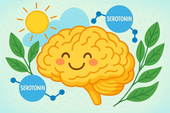
5-HTP and Serotonin: A Natural Path to Lifting Mood
Discover how 5-HTP naturally boosts serotonin 🌞 — the neurotransmitter behind mood, sleep, and emotional balance. Learn how this plant-derived compound supports happiness, reduces anxiety, and improves rest by helping your brain create more serotonin the gentle, natural way.
-
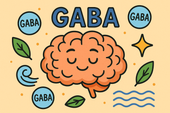
GABA Supplements for Reducing Anxiety and Mood Swings
Discover how GABA supplements can help reduce anxiety and balance mood naturally 🌿. Learn how this calming neurotransmitter works to quiet the mind, ease stress, and improve sleep — plus which nutrients and habits can boost your body’s own GABA production for long-term emotional stability.
-
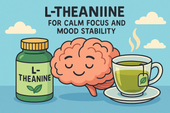
L-Theanine for Calm Focus and Mood Stability
Discover how L-theanine, the calming compound found in green tea 🍵, promotes focus, relaxation, and mood stability. Learn the science behind how it balances neurotransmitters, reduces stress hormones, and enhances clarity — helping you stay centered, calm, and productive without sedation.
-
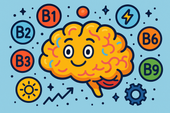
B Vitamins and Brain Chemistry: Supporting Energy and Emotional Balance
Discover how B vitamins power your brain chemistry ⚡. Learn how B6, B9, and B12 support serotonin, dopamine, and energy production — helping boost focus, mood, and emotional balance. From diet to supplements, explore how this vital nutrient group keeps your mind resilient and your energy steady.
-

Supplements for Bipolar Disorder: What May Support Stability
Discover the best supplements for bipolar disorder 🌿 that may support emotional stability and brain health. Learn how nutrients like omega-3s, magnesium, vitamin D, and NAC can help reduce inflammation, balance neurotransmitters, and complement traditional treatment safely.

















































